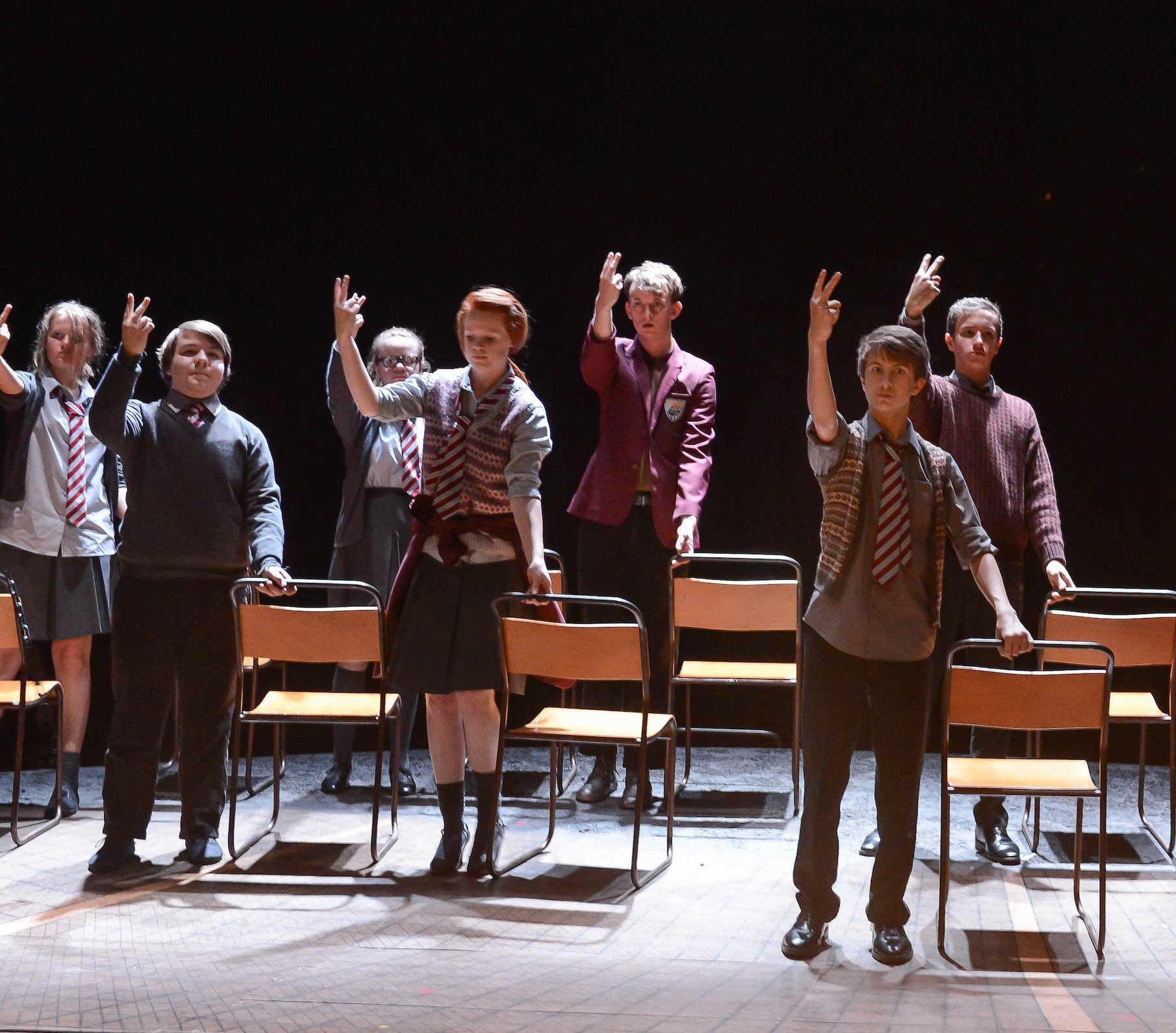
A Derby Theatre production of Kes
Photo: Robert Day
Putting learning first
Since Derby Theatre became a learning theatre academics and students work alongside theatre staff. Sarah Brigham explains why.
Derby Theatre (formerly known as Derby Playhouse) is re-imagining what a regional theatre can be by placing learning at the heart of everything we do. We are a wholly owned subsidiary of the University of Derby, and indeed the university is our biggest funder, but we operate on an entirely independent basis and also receive support from Arts Council England (ACE) and a number of trusts and foundations, as well as our loyal audience.
I started as Artistic Director in January 2013 and have set about realising the theatre’s vision to combine artistic excellence with an ambitious approach to creative learning. Putting it simply, I see my job as asking the question: “What happens when learning is the first question in making a piece of art, not the last?”
We are interested in looking at what a learning journey might look like for everyone who engages with us
On a practical level, the partnership means we have anywhere from 100 to 150 students a week receiving lectures in our theatre. The academic staff share an office and work side by side with the theatre staff. Our ambition is to include staff and students in all aspects of the theatre’s life. As I write this, I have just started rehearsals for our next professionally produced show, a new version of The Odyssey. At the read-through on the first day of rehearsals, as well as everyone in the whole building being present, we had 15 technical theatre and theatre arts students who had the opportunity to question the designer about the set and me on how I am approaching the text, and to engage with our whole creative team. In the rehearsal room, our Company Aside programme means each production role has a shadowing assistant working alongside the professional and learning their craft.
Learning is not just for the student population. We are interested in what a learning journey might look like for everyone who engages with us – our staff, our audience, our participants and our community. In any season you are as likely to see a three-week run of an in-house produced, professional show as you are to take part in a symposium on emerging practice, a workshop on fight direction, or an inaugural lecture from the university academic staff.
Last week we ran a full staff development day and our ambition is to support each staff member to learn how to disseminate their skills. From the Business Development Manager running fundraising courses, through to a senior technician training teachers in lighting design, we hope that each and every staff member will eventually be enabled to deliver real learning objectives for others interested in their work.
We want to make learning opportunities open to our audiences too. We recognise that audiences must regularly engage with our frontline staff − our ushers, box office and café bar. In light of this, we are training our customer services team to become ‘Talking programmes’, whereby they sit in rehearsals, absorb the artistic process and become equipped to not only answer questions from the audiences about anything, from how did you make them fly, to what did that bit of set cost, but also to engage the audience in conversation and ignite debate and discussion.
The university link also means that our support for artists is key: from supporting children and young people on their first steps towards creativity, through to developing graduate companies, nurturing a vibrant local artistic community and supporting those who can’t find what they need from formal training.
The ‘learning theatre model’ we are piloting has not just excited us. In 12 months we have attracted attention for this way of working. Along with the University of Derby we have won the Times Higher Education Award for Innovation and Excellence in the Arts, been part of the successful co-production with Headlong and The Nuffield which led to the TMA Award for Blanche McIntyre for Best Director on The Seagull. Plus our unique partnership with the university has been praised by Sir Peter Bazalgette, Chair of ACE.
So, what have we learnt in 12 months? Learning and development, especially of emerging or new artists, takes time. To genuinely engage in learning, more resources are needed, not less. To give an example, if I am genuinely to involve 30 young people in a professional production, as we did last autumn with Kes, and give them a deep and rich experience, then a four-week rehearsal period is not going to cut it. So let’s remix our thoughts on learning and theatre. Let us no longer see them as two separate routes between which we need to furrow a path or find a bridge. Let’s together find the third road: where theatre and learning are truly integrated as one whole. Let’s be open to the fact that you might learn something tonight when you step through the door of our auditorium, and let’s not be scared that the audience, the participant, the non-professional might teach us something too. Let’s see every theatre as a centre for learning − every foyer as a classroom, every rehearsal studio as an interactive treasure trove of gifts waiting for us all to unwrap: young and old, professional and amateur, audiences and students.
Ask yourself the question: what does happen when learning is the first thought, not the last? And like us, you’ll find the answer: Theatre becomes a place to ignite your imagination, develop new skills, excite your taste buds for life… and you might even get to see a decent play too.
Sarah Brigham is Artistic Director of Derby Theatre.
www.derbytheatre.co.uk
@derbytheatre
Join the Discussion
You must be logged in to post a comment.